CommonLit’s Free Texts Help Explore Big Ideas
By Michelle E. Brown
When I taught middle school reading, I used to spend hours every evening searching for free news articles, poems, or short stories that I could pair with novels. The process was incredibly frustrating—it seemed like everywhere I looked, there was a paywall, login, district code, or page view limit getting between me and the content I needed to do my job well.
When I arrived at graduate school in the fall of 2013, my academic adviser challenged me to use my time in graduate school to begin solving a problem in the education world. I quickly learned that I was not alone in my frustration—there were 15 graduate students at the Harvard Graduate School of Education who had also spent many Sunday evenings searching for useable texts and were eager to do something about it.
Our team formed a student organization called CommonLit, and together, we began to build the collection. Now, CommonLit is a 501(c)(3) nonprofit organization that relies on the help of veteran teachers around the nation to identify high-quality supplemental texts and share them freely with teachers.
How CommonLit is organized
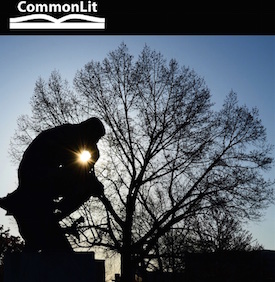 The real “special sauce” of CommonLit is its organizing principle. The texts are sorted by theme, question, and Lexile® reading level. This makes it easier for teachers to find texts that are meaningfully related to one another so that students can dig deep into the language to answer essential questions like, “How does power corrupt?” or “What makes you who you are?” In other words, the way CommonLit is organized makes it easier for teachers to focus on big ideas in a text.
The real “special sauce” of CommonLit is its organizing principle. The texts are sorted by theme, question, and Lexile® reading level. This makes it easier for teachers to find texts that are meaningfully related to one another so that students can dig deep into the language to answer essential questions like, “How does power corrupt?” or “What makes you who you are?” In other words, the way CommonLit is organized makes it easier for teachers to focus on big ideas in a text.
In the spring of 2014, a team of HGSE graduate students conducted a pilot study in five classrooms in Boston to test whether or not CommonLit made students more engaged in reading, and the results were very promising!
It turns out, just as we suspected, that students (and teachers) get more excited about reading when the focus of reading is answering big, important questions. It gives reading a more authentic purpose.
Think about why you read (I’m guessing it’s probably not because you want to do well on a multiple choice test). We read because we have a need to make sense of the world around us and draw original conclusions. Why do people follow the crowd? What does it mean to be “grown up”? These are age-old questions that run through life and literature, and kids love discussing them!
Here’s how CommonLit works
Themes & Questions: At CommonLit.Org (www.commonlit.org) teachers can access a free collection of poems, short stories, news articles, historical documents, and excerpts of classic literature. The collection is organized by fourteen commonly-taught themes that will help spark a discussion or debate for your middle grades classroom. The website offers deep, thought-provoking questions for each text.
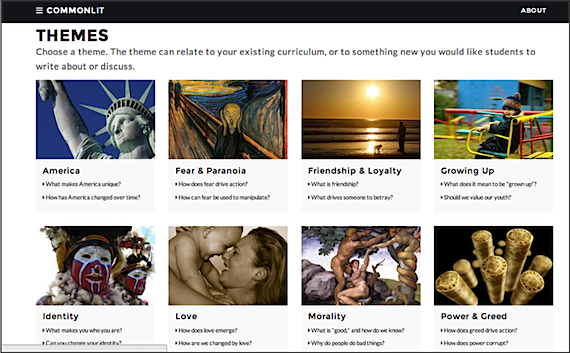
Focus on Deep Inquiry: Each CommonLit theme category is broken down by essential questions. For example, the category “Resilience” includes the questions “How does a person overcome adversity” and “How does society prevail in the face of challenges?” with a database of corresponding texts.
Flexible uses: Teachers can use the 28 essential questions for PBL or unit planning (Read More about CommonLit and PBL in this Suzie Boss article), to spark a lively class discussion, or to develop an evidence-based writing activity.
Plan A Cross-Curricular Unit
Students learn more when what they’re reading builds on what they’re learning about in other classes. But, with so many standards to cover, it can be extraordinarily difficult to plan a cross curricular unit.
CommonLit is a themed resource for everyone on your grade level team— the site has science articles for science class, historical documents for social studies class, and literature for English class. Check back regularly—texts are added to the collection every day.
Differentiation Made Easy (Or at least easier!)
All of the texts at CommonLit.Org are sorted into three Lexile-determined levels (Beginner, Intermediate, Advanced, grades 4-9) to make it easier to find appropriately challenging texts for your class.
Note to teachers: These levels aren’t meant to be prescriptive for students (you know your students best), but rather another handy sorting mechanism to save you time in your hunt for great supplemental texts.
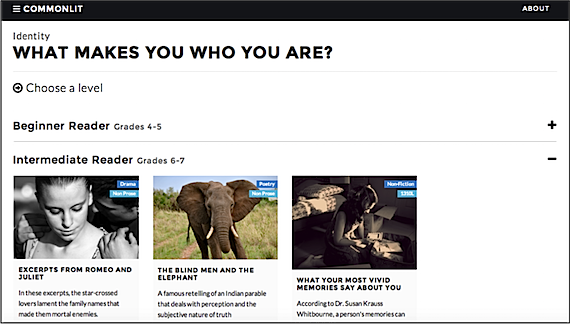
Free & Ready for Download & Use
CommonLit texts are organized for teachers (Theme > Discussion Question > Level), but formatted for students. It’s easy to download/print each text. CommonLit is free and open-access to teachers. No logins, paywalls, district codes or other annoying barriers will prevent teachers from accessing the resources on the site.
Join the CommonLit Community
CommonLit.Org is a nonprofit organization building a growing collection of supplemental texts, curated by teachers, for teachers. Here are some ways to connect:
- Get the CommonLit Newsletter: Our collection is growing! Subscribe to CommonLit’s monthly update about new, featured texts. Sign Up Here
- Become a CommonLit Contributor: Email info@commonlit.org to join the team of veteran reading teachers who suggest content for the site.
- Share Great Ideas: Tell us (info@commonlit.org) how you used CommonLit in your class, or email us a picture. We would love to share your story with our network!
- Follow @CommonLit on Twitter, Facebook, or Pinterest
- Help spread the word about CommonLit in your school, district or professional learning network!
Michelle E. Brown is the founder and CEO of CommonLit, a professor of Spanish at Marywood University, and a former 7th grade reading teacher in Massachusetts and Mississippi. She earned an M.Ed. in Education Policy and Management from the Harvard University Graduate School of Education in 2014.

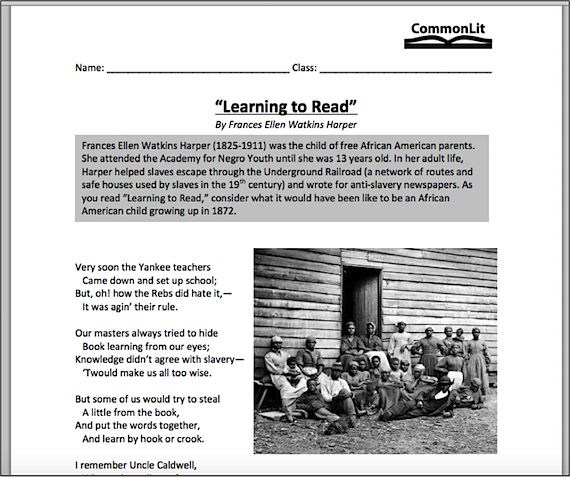

































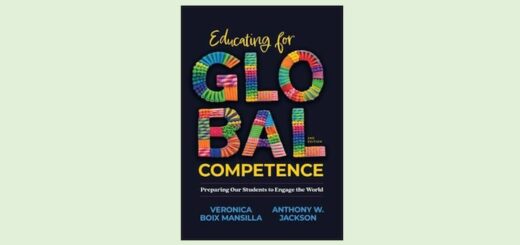
Anything like this for the high school level and ELL ( English language learners)?
I agree with Karen Z. Nothing like this exists for high school ELLS and their teachers.